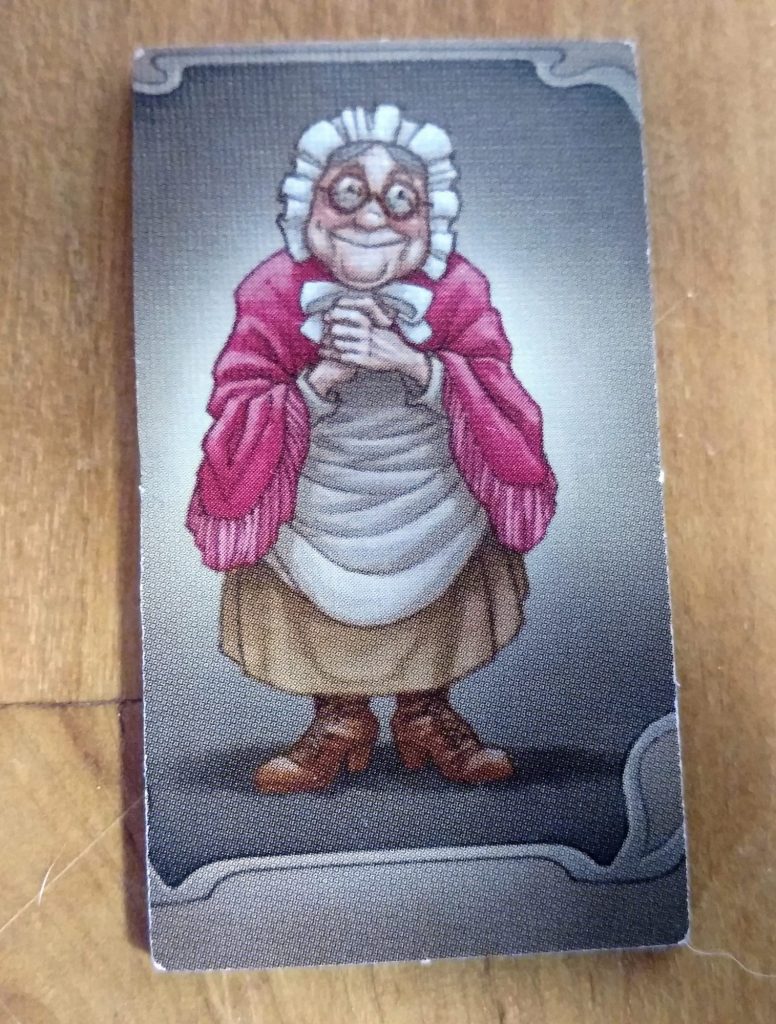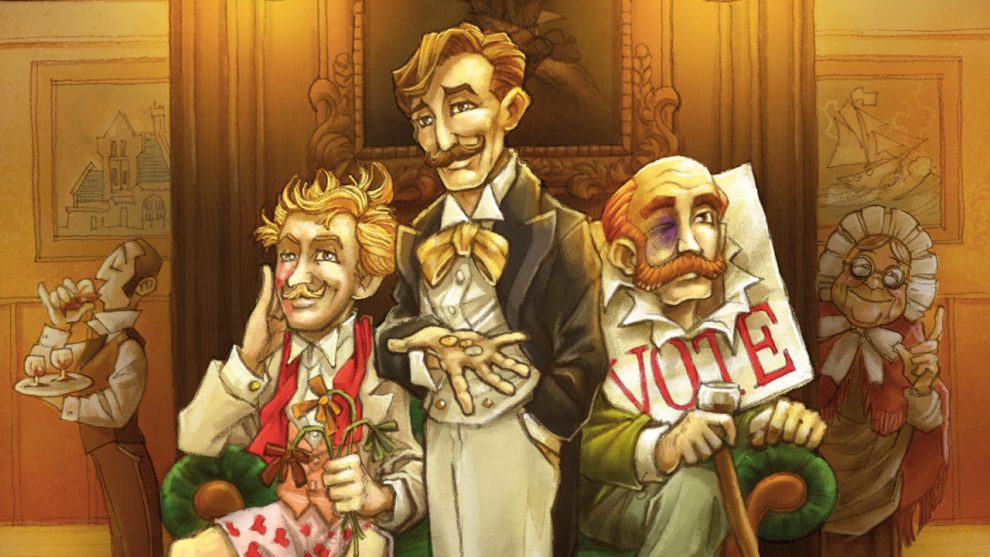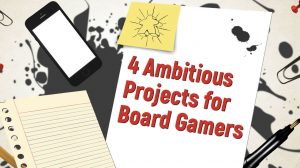I’m going to let all of you game designers in on a secret. If you want me to salivate at the idea of getting my hands on your newest title, there’s one guaranteed method: give me a really strange theme. I’ve seen dragons and knights, and I’ve seen spaceships and aliens. Ghosts? Been there, done that. Farming? I practically have an honorary agriculture degree.
I’ll play games with these familiar themes, but the bar for success is a lot higher. If you hand me a game that’s all about warring intergalactic civilizations, it’s going to be held up in comparison to giants like Eclipse or Forbidden Stars, and that’s a really tough mark to hit.
Contrast this with games like Burgle Bros (inept cat burglars trying to rob a building), Panic On Wall Street (screaming investors and sellers trying not to go wildly broke in thirty frantic seconds), or Celestia (a bunch of people on a skyship trying to avoid gusts of wind as they hop from cloud to cloud). These games plant a flag in the ground, trumpeting their unique theme, and by doing so, they anchor everything that happens in the game to that theme. It also makes the game easier to sell to your friends. Want an example? Sit your friends down at the table, plop down a copy of The Prodigals Club, and announce, “Today, we’re going compete to be the biggest, most self-entitled bastard at this table.”
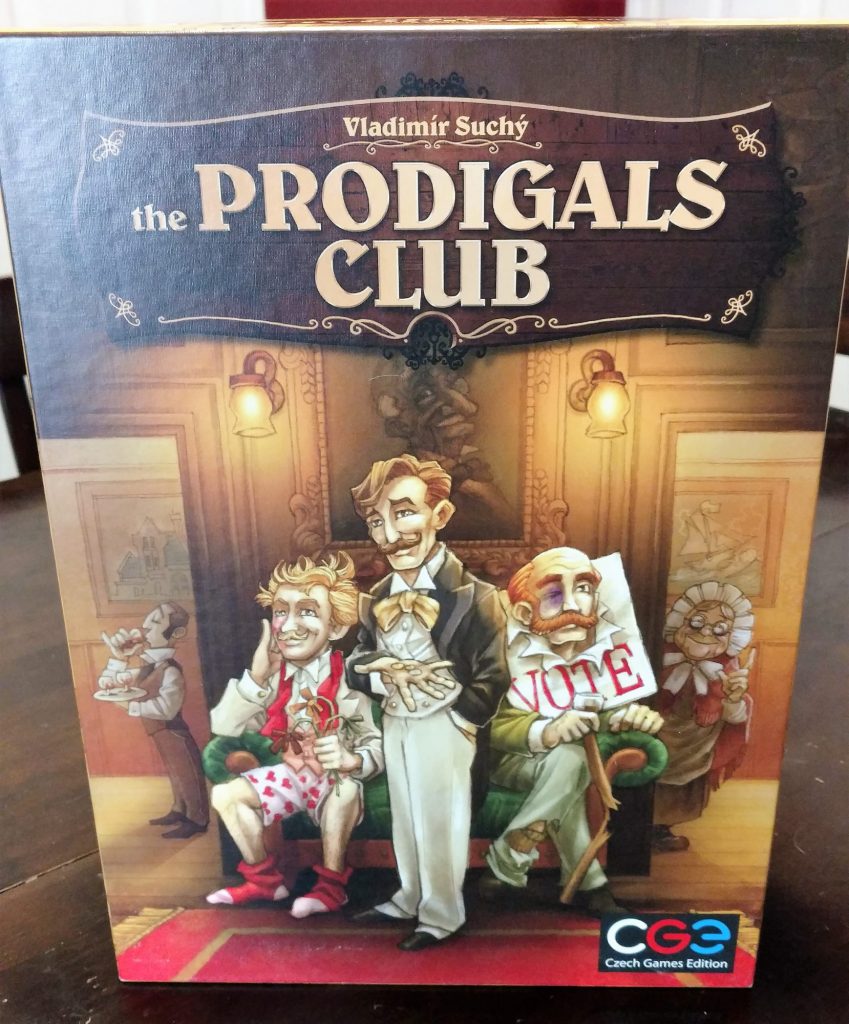
The Prodigals Club, from Czech Games, will drop you and your friends in the roles of wealthy sons of powerful men. Picture insufferable youths with popped collars all with names like Chadswick or Thurston, sweatshirts tied around their necks, as they muse about where they might summer next year, and you’ve got the idea. Each of you has it made. Your daddies have bought you piles of luxury items and fat bank accounts, you’ve spread enough cash around town to ensure that you are the most popular man-children in the Hamptons, and as a birthday gift, your parents have bought you a pile of votes in the upcoming city council election to ensure that you have a cushy job.
And you’re bored stiff.
So, you and your chums (you must refer to your opponents as chums, otherwise Robin Leach crawls out of your television and slaps you with a smoked salmon) have laid on a wager. In five short rounds, you’re all going to try to lose everything you own, get decimated in the upcoming election, and make sure that everyone in town hates your guts. You’ll be doing this through a worker placement game that’s divided into three primary minigames, all going at the same time. On each turn, you’ll send one of your lackeys (new money, don’t you know, they do try so very hard) out to accomplish a task designed to ruin your station in society as quickly as possible.

The Prodigals Club is a daunting game when it’s first set up. A central board is surrounded by three minigame boards, each with stacks of tokens and cards. The three minigames (wealth, election, and popularity) can all be used, or, if you want a simpler game, you can select two of the minigames and leave the third in the box. In addition, if you own Vladimír Suchý’s previous game, Last Will, you can actually socket the entirety of the Last Will game onto The Prodigals Club board in place of the wealth minigame, creating a horrifying Voltron of privilege and entitlement. (Note: the author has not played with the two games combined together, because the idea of trying to do that makes the author curl up in the fetal position and weep.)
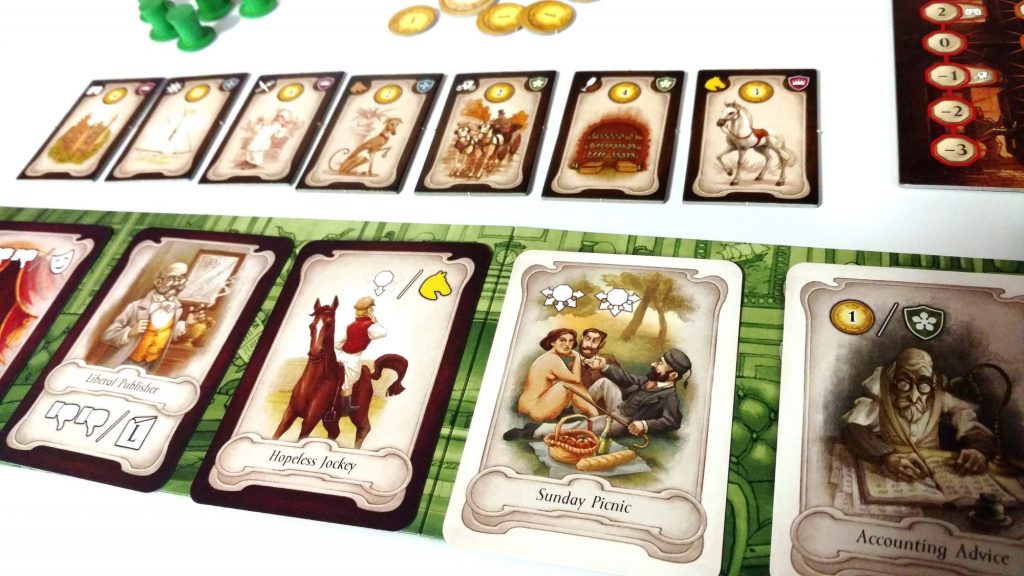 Each player will have a personal player board, as well as a board to track your popularity within the city. The personal board has six slots in which to socket cards, which will either offer a one-shot event that impacts your wealth, votes, or popularity, or black-bordered cards that can be used on every round. With these tools, as well as a handful of cheerful top hats that are your loyal servants, just waiting to rush out and do your bidding, you’ll set forward to ruin your reputation, your future, and your finances just as fast as you can. How?
Each player will have a personal player board, as well as a board to track your popularity within the city. The personal board has six slots in which to socket cards, which will either offer a one-shot event that impacts your wealth, votes, or popularity, or black-bordered cards that can be used on every round. With these tools, as well as a handful of cheerful top hats that are your loyal servants, just waiting to rush out and do your bidding, you’ll set forward to ruin your reputation, your future, and your finances just as fast as you can. How?
Ladies and gentlemen, please allow me to be your guide. I call this presentation, “Three Steps to Making Mummy and Daddy bring the Yacht home from Monte Carlo Early.”
Step One: Destitution!
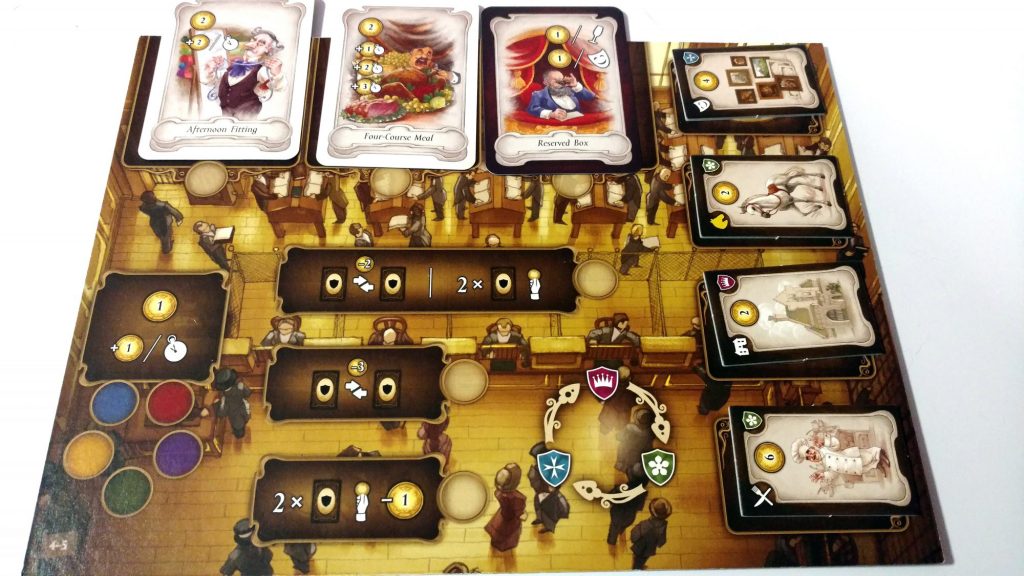
That’s right, the only way you’re going to show your friends (I mean chums! Chums! I’m sorry, Mr. Leach! OH GOD NO IT’S SO SALTY!) that you truly understand the plight of the common man is to divest yourself of all of your many possessions. You start the game with an assortment of horses, butlers, carriages, mansions, and a bank account so fat that 1970’s sitcom characters are constantly making jokes at its expense. You can send your peons to go sell your goods at a substantial discount, trade them for less valuable goods (picture them leaving with a Monet and coming back with a velvet Elvis), and whittling away at your cash reserves by throwing lavish parties or going to expensive restaurants.
But there’s a downside. Throughout the game, opportunities in all three sections will pop up that you’ll only be able to take advantage of if you still have various possessions, such as a horse. Do you still have a horse? You don’t, do you? You traded it to Davenport for a goat, didn’t you? As such, the wealth board is a bit of a balancing act. If you wait too long, you’ll be standing at the finish line surrounded by houses and boats, but if you throw a giant estate sale at the beginning of the game and are left with nothing, you’ll have to watch Chadston and Thurmont take advantage of all of the wonderful carriage-based activities in their carriages without you.
Think you’ve got a nice balance to bringing yourself to the brink of financial ruin? That’s great, because you still have to deal with…
Step Two: Political Corruption!
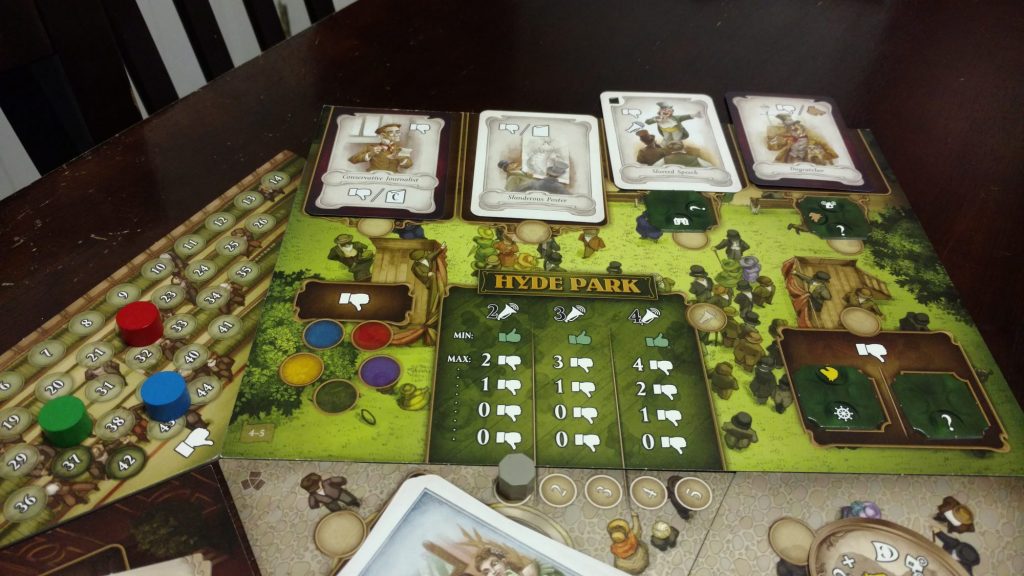
You haven’t even shown up for the election, but thanks to daddy making it rain at all the town meetings, you already have a giant pile of votes lined up. At this rate, you’ll win the city council seat, and actually have to do work. Well, not work per se, but still, it’ll take you away from the sailing club, and your uncle didn’t buy you that $900 Mont Blanc to actually WRITE with. This clearly won’t do, so it’s time to make the electorate hate your stinking guts!
Your various butlers and maids will scurry off to spread salacious rumors about you, curry disfavor with the liberal and conservative parties, and bribe newspaper reporters to publish scathing editorials about what you did with Davenport’s goat. When all else fails, you can send them to climb up on stage and bellow to the seething masses about what a terrible fellow you are. At the end of each round, an election is held, and the votes are tallied on an election tracker. By the end of the game, one of you will be gloomily accepting the gloating concession calls from your chums as you prepare for a life of civil service. The horror.
But here’s the thing. Even if you’re completely broke and got less votes than I did in my ill-fated run for student president (my speech about instituting mandatory D&D was not particularly well-received), the true measure of a man’s wealth lies in those he can call friend. You’re surrounded by those that love you for who you are, and don’t care if you’re rich or poor.
Yeah, we’re going to have to do something about those jerks. Which brings us to…
Step Three: Making them Love to Hate You!
Your family’s roots run deep in this community, and everywhere you go, you’re greeted with more warmth than an alcoholic mailman returning to his watering hole. It’s not going to be easy to make these adoring fans turn their backs on you. Thankfully, you have your devoted minions! What? No, they don’t take days off. What on earth would they do with a day off? They’d much rather go sprint naked through picnics (not making that up), urinate in people’s beer (still not making that up), and scream offensive language at children (this game is strange, people), all on your behalf. Just picture your exhausted, half-crazed butler wearing only a top hat and a bow tie rampaging through someone’s potato salad, and you’ll have a vague idea of why people aren’t talking to you anymore.
As people begin to tire of your diabolical hijinks, your four closest friends will begin sliding down the popularity tracker, slipping past each other and sinking deeper and deeper into contempt for you. Soon, they’ll stop calling, stop inviting you to their birthday parties, and will “accidentally” delete the save game for Final Fantasy VII you’ve been working on for two months, GREG. Success in this section of the game will see you abandoned and hated. Uh, yay?
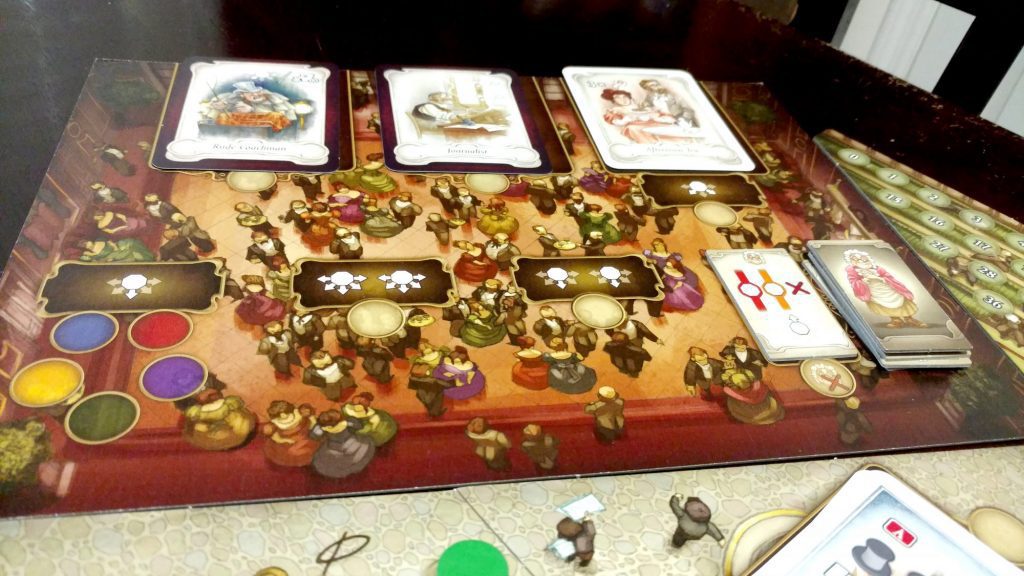
But there’s a problem. A sweet, adorable, kindly old lady of a problem. It’s your Aunt Beatrice, and this loving relative will quickly become the most hated individual on the board.
One of the tasks that you can send your barely-conscious staffers to complete involves them walking up to this wonderfully generous octogenarian, saying, “Yo, lady, Chadsmonk sent me,” and spitting in their face. Aunt Beatrice will be highly offended, and when she goes up to all of the people that have been offended by the various mischievous atrocities to reassure you that you’re all good boys, really, it’s society and those darned video games that are to blame, not you, your name will be left out of the discussion.
Aunt Beatrice is a small part of the game, but easily one of the highlights. After tirelessly working to anger every person you know, you turn around to see this infuriatingly sweet woman undoing all the work that you’ve done. Yes, you can avoid the penalty of affection by insulting her, but only one player gets to do that each round, and since Aunt Beatrice’s memory isn’t very good, she’s forgotten your slight by the next turn. Flipping the Beatrice token and hearing the cries of strangled rage from most of the table as your friends clamber back up the friendship tracker is one of the funniest mechanics I’ve ever seen.
After five rounds, the game comes to an end, and The Prodigals Club’s most diabolical mechanic rears its ugly head. Each of the three minigames generates a score, and the player with the lowest score wins. The problem? Your final score is that of the minigame that you had the highest score. So you can be so hated that people are screaming for your head, you lost so many votes that they retroactively took away your library card, but because you lost track of time and finished the game with a house and Picasso that slipped your mind, victory is lost. It’s a constant puzzle, demanding that you balance your attention between all three challenges.
The Prodigals Club is one of the funnier experiences that you can have at the game table, with a unique theme and excellent worker placement mechanics. It’s creative, it’s surprising, and it’s genuinely silly throughout.
I just wish that it was a better game.
I said at the beginning of this review that a unique theme will sell a game for me, and that’s true. But the games that elevate past the gimmick of their theme are those that understand that theme and mechanics have to both be innovative and compelling. The Prodigals Club definitely hits on the theme, but the mechanics come together to form a confusing and often frustrating mess. As good as the idea of the game is, balancing all three minigames together is an exercise in desperation, as every choice you make is one that causes you to lose ground in two other areas. The rules are much more dense than they need to be, which means that most players are still asking questions and seeking clarifications on the last round.
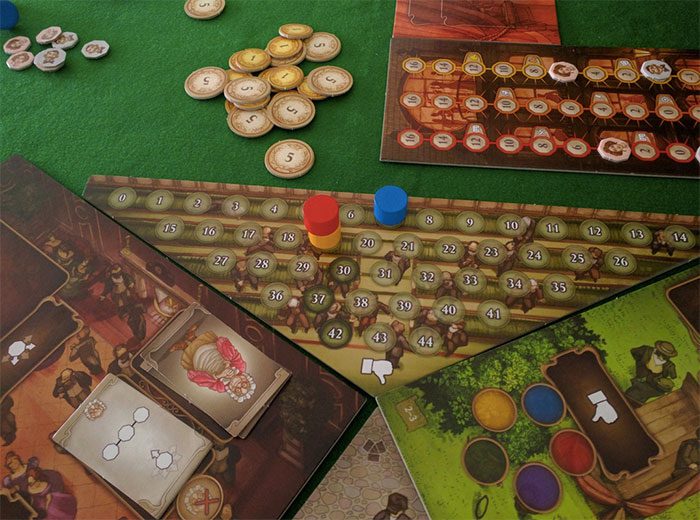
The theme of this game is a work of satirical beauty, parodying culture as well as board games themselves. But this subversion of expectations doesn’t extend to the actual gameplay, which simply has you gathering cards and assembling tokens. With the exception of Aunt Beatrice, nothing in the mechanics will ever catch your attention or encourage interesting decisions. The stories that you will tell about this game are all about the funny pictures on the cards, but never about the gameplay itself. To make matters worse, there are several mechanics that make no sense. For example, as friends grow to hate you and drop down the friendship tracker, you will occasionally gain access to extra boats or horses that you can use for card actions. Why? I have no idea. This, along with a strange matching game that’s part of the election board, feels shoehorned in with no rhyme or reason.
But the worst part is that finale. The final scoring is just infuriating, as the game insists that you ignore everything that you did well, and focus solely on your worst performance. While I understand the idea of pushing the player to balance all three minigames, this mechanic essentially guarantees that the last thing to happen in the game will disappoint and frustrate everyone at the table.
Here’s the thing, though. I’ve owned The Prodigals Club for a while now, and while I come away from every game feeling let down, it keeps finding its way back to my table. It’s a mediocre worker placement game, the type that I generally abandon after one or two playthroughs, but the theme is so good, so genuinely funny and compelling, that I keep coming back. There’s nothing wrong with a forgettable and slightly frustrating game that makes everyone at the table laugh, and as an introduction to how wonderful and weird board games can be, you could definitely do worse.
Besides, someone’s got to shut Aunt Beatrice up.
